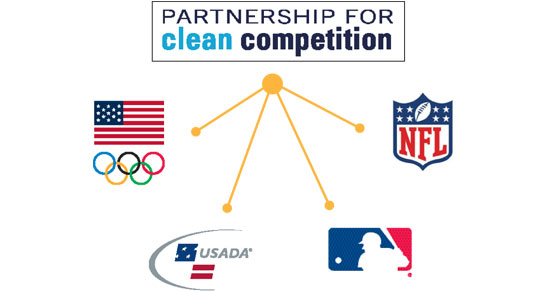 Committed to advancing quality anti-doping research and development, the Partnership for Clean Competition (PCC) was launched in 2008 as a collaboration between the U.S. Olympic Committee, the U.S. Anti-Doping Agency, the National Football League, and Major League Baseball. The PCC empowers independent anti-doping research by leading scientists across a range of disciplines in a coordinated effort to protect the integrity of sport and public health.
Committed to advancing quality anti-doping research and development, the Partnership for Clean Competition (PCC) was launched in 2008 as a collaboration between the U.S. Olympic Committee, the U.S. Anti-Doping Agency, the National Football League, and Major League Baseball. The PCC empowers independent anti-doping research by leading scientists across a range of disciplines in a coordinated effort to protect the integrity of sport and public health.
With support from some of America’s top sports entities, the nonprofit has the ability to fund research that helps to both detect and deter the use of performance-enhancing drugs by competitors across all playing surfaces. The PCC maintains a broad spectrum of scientific projects in its portfolio, including ventures that offer short-term advances and projects investigating potentially game-changing approaches that may require years of work.
Even though fully developed, investigator-initiated projects continue to provide the best opportunities for advancing anti-doping science, the PCC actively maintains the following programs in order to drive additional progress in the field.
PCC Working Groups
Serving as a supplement to the PCC’s grant-funded research, the PCC Working Groups Program facilitates scientific collaboration between researchers around the world who specialize in various fields, ranging from chemistry to hematology.
Launched in 2012, the interdisciplinary Working Groups address some of the most relevant issues in anti-doping science, such as human growth hormone (hGH) and hematology, which is the study of the physiology of blood. They also investigate alternative specimens like oral fluid, dried blood spots, and breath.
By employing an expert group approach to project management, the outcomes of focused studies and method validation can be rapidly incorporated into the routine testing protocol.
PCC Micro-Grant Program
Since anti-doping science is an ever-evolving field, it’s sometimes necessary to conduct time-sensitive research based on trends and emerging information surrounding testing methods and performance-enhancing substances.
By maintaining the Micro-Grant Program, the PCC has the ability to quickly fund targeted anti-doping research projects to advance testing methodology and address immediate gaps in anti-doping knowledge. Unlike other grant programs, the PCC Micro-Grant Program accepts applications year-round so applicants don’t have to wait for a fixed funding cycle. Funding decisions are also made in under two weeks, rather than in months.
Even though micro-grant research projects last less than six months, the findings have real-world application and can help inform decision-making by athletic governing bodies worldwide. The research funded by the PCC Micro-Grant Program is often used to justify additional studies on various topics, including questionable substances, improved collection methods, and longer detection windows. For example, micro-grant research on breath analysis technology has resulted in the commencement of a larger study.
For 2016, the PCC will double the amount of micro-grants awarded in 2014 and 2015, effectively extending the impact of the swiftest funding program available to anti-doping researchers.
PCC Fellowship Program
While the Micro-Grants Program enables cutting-edge research, the PCC Fellowship Program advances the future of anti-doping science by supporting a new generation of researchers who are interested in anti-doping.
Through the Fellowship Program, young scientists have the opportunity to participate in a two-year training program that gives them unparalleled access to leading anti-doping researchers and mentors. The fellows spend at least a year working in a laboratory accredited by the World Anti-Doping Agency, where they contribute to research and become well-versed in anti-doping standards.
Recently, the PCC Fellowship Program funded its first international fellow, thereby strengthening the international anti-doping community and providing a promising career trajectory for the young scientist.
“Although anti-doping occupies a narrow niche in the global science community, it is important to be able to respond quickly to answer critical questions, some of which have broader relevance in medicine and science,” said USADA’s Chief Science Officer Larry Bowers.



